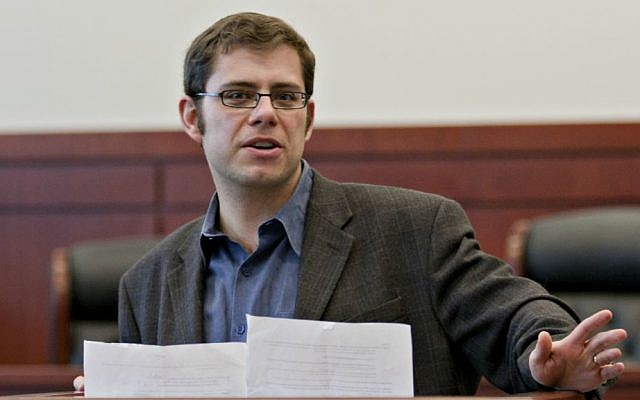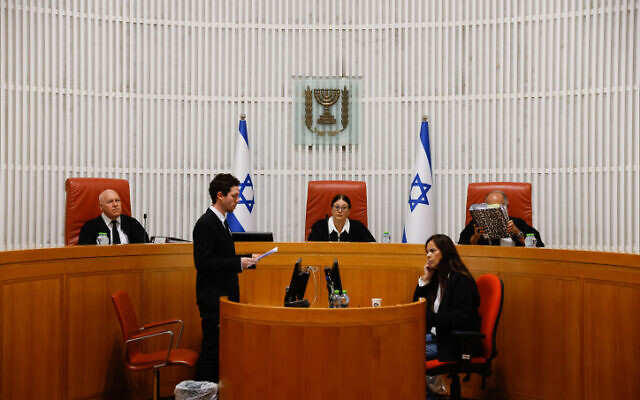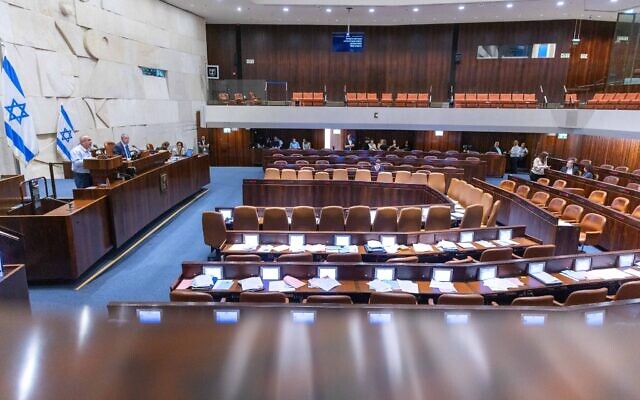T. Belman. Thankfully this article presents both sides. We are in this quandary because, the High Court took it upon itself to declare the Basic Laws to be a stand-in for Israel’s absent constitution, allowing the court to strike down legislation and government decisions that violate rights set forth in Basic Laws. It had no right to do this. Only the legislative body can enact a constitutional provision. That’s where the problem started.
It is also about values. The Court upholds liberal values, whereas the Knesset upholds conservative values.
Advocates for a High Court override say such a law is necessary to ensure the will of the majority is enforced; opponents argue the rights of minorities would be trampled
Today, 6:50 am
One of the most critical consequences of the November election is that it will likely bring to power a governing coalition comprising four parties that are all strong, if not ardent, proponents of radically overhauling the principle of judicial review in the Jewish state.
At stake is the ability of the High Court of Justice to strike down legislation that it deems is in violation of the human and civil rights stipulated in Israel’s Basic Laws, as well as the ability to reverse government and administrative decisions on the same basis.
This issue has developed over the last quarter of a century into a substantive point of dispute, first between the right and left and today between what might more accurately be described as the populist and liberal democratic camps.
In a landmark ruling in 1995, the High Court asserted that the Basic Law: Human Dignity and Liberty, approved in 1992 by a simple majority, had semi-constitutional status and that the court could therefore annul laws passed by the Knesset if they were incommensurate with that Basic Law.
Since then, it has annulled 22 laws, or clauses within the legislation, on this basis, and reversed numerous government resolutions and administrative rulings which it deemed also violated the principles of the Basic Laws.
These rulings have dealt with some of the most fundamental issues of human rights and the rule of law in Israel, including democratic conduct in the Knesset, freedom of assembly and protest, the indefinite detention of asylum seekers and migrants, property rights including those of Palestinians in the West Bank, and critical religion and state issues.
The court ruled against key policies of the predominantly right-wing, religious governments led by Prime Minister Benjamin Netanyahu from 2009 to 2021, which generated cries among his allies to rein in what they saw as an increasingly activist court defying the will of the legislature, and by extension the Israeli majority which elected it.
The crusade for a High Court override
Ahead of the 2022 general election, the Religious Zionism party, which includes the far-right, ultra-nationalist Otzma Yehudit faction, set out a radical agenda for overhauling the entire legal and judicial system, including the principle of judicial review and the High Court’s power to restrain the Knesset and the government.
Among the many provisions of this legal platform is a stipulation that the next government enact what is known as a High Court override law, which would allow the Knesset to re-legislate a law struck down by the court as contravening one of the Basic Laws.
Party leader MK Bezalel Smotrich said as he announced his proposed reform that Religious Zionism would not enter the government without a guarantee that these measures would be enacted, a position reiterated by the party after the election.
Similarly, the ultra-Orthodox United Torah Judaism party has insisted that it will not enter a coalition without a guarantee that the government will pass a High Court override law, and prominent Likud MKs including Miki Zohar have insisted that such legislation must be the first priority of the government.
Netanyahu has remained tight-lipped as to whether he wishes to go ahead with such legislation, but he has in the past endorsed a similar proposal, stating in 2019 that it was necessary to “restore balance” between the branches of government, including enabling the Knesset to re-legislate laws struck down by the High Court.
Opposition leader Benjamin Netanyahu speaks to US President Joe Biden, from a Likud office in Tel Aviv on November 7, 2022. (Courtesy Likud)
The plan
The most detailed plan for judicial reform laid out so far by any likely coalition partner is that of Religious Zionism, authored by Smotrich and fellow party MK Simcha Rothman.
Along with a High Court override clause, the proposals seek to restrict when the court could strike down legislation in the first place. Smotrich’s plan would permit the High Court to strike down legislation only by a unanimous decision of a panel of all 15 judges on the court.
Should the court annul a law in this way, the Knesset could re-legislate the legislation for a four-year period, and then again after that period as a permanent statute.
The platform does not stipulate how many MKs would be required to re-legislate a law the court struck down, but Rothman himself has said a majority of 61 — an absolute majority — is the maximum number he and his party would contemplate.
Others in Likud and other parties have proposed an even lower bar, suggesting that a simple majority of the Knesset members present for a vote would be required to override the High Court.

Likud head Benjamin Netanyahu (center) speaks with Religious Zionism chief Bezalel Smotrich (second from left) during informal coalition talks in Jerusalem on November 6, 2022. (Courtesy)
The mechanism for enacting a High Court override law would be a relatively simple process in which a clause would be inserted into the relevant Basic Laws, primarily the Basic Law: Human Dignity and Liberty, stipulating the Knesset’s right to re-legislate a law the court had previously struck down as violating the terms of that Basic Law.
Such a clause was added to the Basic Law: Freedom of Occupation in 1994 but since the rights enumerated in the Basic Law: Human Dignity and Liberty are far broader than those in Freedom of Occupation, an override clause in the latter would have a far greater impact.
Indeed, almost every law struck down by the High Court has been based on the Basic Law: Human Dignity and Liberty.
Smotrich’s legal platform also seeks to annul the court’s ability to reverse government and ministerial decisions that violate the Basic Laws, a step the High Court has taken far more frequently than striking down legislation.
Annulling this function of the court would be achieved by passing a Basic Law: The Judiciary, according to Religious Zionism’s platform.
Smotrich’s announcement of the reform plans turned them into a focal point of the recent election campaign.
The liberal democratic camp declared that such changes would destroy the only check on legislative and executive power in Israel’s system of government and thereby endanger minority rights, while the right-wing, populist camp argued that the High Court had usurped power from the other two branches without legislative approval and trampled on the will of the majority through its judicial interventionism.
The end of checks on government power in Israel?
Yedidia Stern, president of the Jewish People Policy Institute and a professor in the Faculty of Law at Bar-Ilan University, argued that an override law requiring a majority of just 61 MKs would remove any concept of the separation of powers from Israel’s system of government.
“The Knesset would have the last word on everything, and a coalition of just 61 MKs could do whatever it wants on every issue,” said Stern.
“If we have such an override clause then there is nothing balancing the power of the Knesset. There will be no separation of powers. It could limit freedom of expression, and freedom of religion; all rights would be dependent on the goodwill of Knesset.”
Stern noted that one of Smotrich’s economic proposals is to ban strikes in sectors dealing with essential services.
“If today a limit on the right to strike was passed by the Knesset, the High Court could consider whether this contravenes the Basic Law; Human Dignity and Liberty. If a High Court override law is passed, then that is no longer an option. There will be no remedy,” he said.
In recent years, the court has ruled that several pieces of government legislation passed in the Knesset violated some of the most fundamental human rights set out in the law for Human Dignity and Liberty.
In 2013, the Knesset passed the “anti-infiltration law” which allowed for the indefinite detention of asylum seekers and migrants until the political situation in their country of origin improved enough for them to be repatriated.
In 2017, the Knesset passed the Settlements Regulation Law allowing for settlements built on private Palestinian land to be retroactively legalized.
Both these laws were struck down by the High Court, the first for violating the fundamental right to liberty and autonomy of the asylum seekers and migrants the law targeted, and the second for violating the property rights of Palestinians while giving unequal preference to the property rights of Israeli settlers.
Smotrich vowed to re-legislate these laws and others in his judicial reform manifesto.
Suzie Navot, a professor of Constitutional Law and a vice president at the liberal Israel Democracy Institute, elaborated further on what she said would be the dangers of a High Court override law along the lines proposed by Religious Zionism.
Navot said that Israel has no check on the power of the government and Knesset other than the court, and noted that unlike other democracies Israel does not have any built-in way to protect the separation of powers, such as a formal constitution, a bicameral legislature, an executive veto on legislation, or constituency-based elections where the parliamentary representative is beholden to his constituents and not a party or its leader.
“The constitutional structure of Israel exposes it to the dangers of populism far more than others since we have no tool for the decentralization of government power,” she said.
“Democracy is not just voting; it is also effective protection for minorities and there is therefore a role for the courts and judicial review.”
The right of the majority to rule
Eugene Kontorovich, a professor at George Mason’s Antonin Scalia School of Law and head of the International Law Department at the conservative Kohelet Policy Forum, dismissed such concerns and argued that the Knesset has every right to reassert its ultimate authority over laws and government decisions in the state of Israel.
Kontorovich, like Smotrich, Rothman, and many others on the right wing, argues that the High Court under former court president Aharon Barak had no right to initiate what has become known as the constitutional revolution back in the 1990s, declaring the Basic Laws to be a stand-in for Israel’s absent constitution, allowing the court to strike down legislation and government decisions that violate rights set forth in Basic Laws.
Barak and the High Court based their position on clause eight of the Basic Law: Human Dignity and Freedom, which stipulates that the rights set forth in the bill cannot be violated except under very specific circumstances.
Kontorovich noted that many of the Basic Laws, including Human Dignity and Freedom, and Freedom of Occupation, were passed with not even an absolute majority but rather a simple majority.
Additionally, he asserted that the Basic Laws were never intended to have constitutional status and as such can be changed or repealed by the same majority by which they were passed.
“The Supreme Court has usurped authority from the Knesset by interpreting laws passed by small majorities as having constitutional status,” said Kontorovich. “The court has invented and made up constitutional doctrine without legislative authority.”
Law professor Eugene Kontorovich (courtesy)
Kontorovich argued that since the High Court had illegitimately assumed this power, the Knesset would be justified in taking it back.
And he said that since the Knesset is legally entitled to nullify the Basic Laws themselves, adding an override clause to those laws would be less intrusive and a reasonable way of restoring balance in the clash between the judiciary and the legislature.
Kontorovich also pointed to the Canadian system of government, wherein the parliament and provincial governments can temporarily override rights listed in the bill of rights, part of Canada’s formal constitution.
“Checks and balances are an idea of constitutional design taken into consideration by the sovereign representatives of the people when designing a constitution,” he said.
“There can be different degrees of checks and balances, so in Canada, it is one way; the UK and the US have different methods.”
The professor posited that the current situation in Israel affords the High Court an all-powerful check without providing any balance to the legislature, which is what the override law would provide.
Asked what checks would remain if a High Court override with a majority of 61 MKs was enacted, Kontorovich said that since Israel’s electoral system of proportional representation means there are always multiple parties in a coalition, obtaining a 61-MK majority is more difficult than it seems and pointed to the difficulties of past governments passing legislation despite holding a majority in Knesset.
Religious Zionism party MK Simcha Rothman in his Knesset office, July 5, 2022. (Jeremy Sharon)
He also argued that the very fact that the Knesset is re-elected every four years constitutes a check on the legislature and executive.
“Every system has its dangers,” he said, positing that Israel’s current system poses dangers to the rights of the majority.
“The basic right of a democracy and its people [is] to have their policy preferences reflected in legislation,” he said.
An absence of restraint on executive and legislative power
Navot, however, took heavy exception to such arguments.
She rejected the idea that the very fact of parliamentary elections could constitute a check on legislative and executive power such as could be exerted by a constitution, judicial review, or other measures restraining the power of the majority.
“Democracy is rule of the people. It comes to expression by majority rule, but if it is of the people then it means all of the people, and therefore the minority needs to be protected all the time, not just once every four years,” Navot declared.
“Elections determine who will rule and what policies will be implemented, but not that we give up the constant protection of minorities because the people are the sovereign, and all the people did not authorize anyone to negate the rights of minorities. That is not democracy.”
The High Court of Justice holds a hearing on petitions demanding that any maritime border deal with Lebanon come to a full vote in the Knesset and be put to a referendum on October 20, 2022. (Fitoussi/Flash90)
She also dismissed the idea that a multi-party coalition constituted a check on legislative and executive power, saying she was unaware of any Western democracy where there is no restraint on such power and where the only form of protection is having more than one party in government.
Navot further pointed out that the Basic Law: Human Dignity and Liberty already permits the Knesset to pass laws that violate its terms, provided that it is for an appropriate purpose and does not disproportionately violate those rights.
She pointed to restrictions on freedom of movement and freedom of occupation inherent in laws passed by the government as part of measures to contain the COVID-19 pandemic as examples that ostensibly violated the rights enumerated in the Basic Law: Human Dignity and Liberty.
The High Court ultimately rejected petitions against those laws filed by human rights groups precisely because it deemed the laws not disproportionate.
And Stern noted that although Canada does have an override law, known as the notwithstanding clause, it also has a constitution and other checks and balances that Israel lacks.
The case for moderate judicial review
But both Stern and Navot conceded that reform to judicial review in Israel was possible and even desirable.
“We do not have rules for the game. That’s the meaning of not having a constitution that secures you from constant change,” said Stern.
“Yes, you can reverse previous reforms but damage might be done before that can happen. We need to learn how to live together while in dispute and how to secure the rights of a minority against any majority in the future.”
Stern said an override clause with a higher number of MKs required to re-legislate a law or with a minimum number of votes from opposition MKs could be considered, alongside other reforms to secure the separation of powers.
Lawmakers at the Knesset plenum in Jerusalem, June 30, 2022. (Olivier Fitoussi/Flash90)
Another option would be to have an override only for issues on the identity of the state, religion and state matters, and other such concerns, but not over matters affecting human and minority rights.
Navot agreed that an override law with an appropriate number of MKs was something that could be considered but only alongside a Basic Law for legislation that would anchor in law the principle of judicial review for the High Court.
Kontorovich was more circumspect. Asked whether it would be preferable to enact an override clause alongside constitutionally enshrined checks and balances, he said simply that it would be almost impossible to agree on such constitutional provisions.
A general override clause was therefore preferable to the current situation, he opined.
For Navot, however, this outcome is unthinkable.
“A general override law will allow the government to infringe on human rights even in an extreme and disproportionate manner and for an inappropriate purpose,” she said.
“The meaning of this is absolute power and 61 MKs would have the power to change the rules of the game, the system of government, and the power of the court. The system will belong to the government, not the people,” she added. “A general override law designed to remove all judicial review is de facto not democratic.”








“Imagine if a Jew entered an Arab village and broke into an Arab house and proceeded to attempt to rape a ten-year-old Arab girl in her bed.
The outrage and the horror expressed by Israelis of every stripe would know no bounds. And rightly so.
The thud of the national breast beating would be heard around the globe.
The Jewish rapist’s trial would be displayed every evening on the news and accompanied by a heated discussion on how many life terms he should get in solitary confinement. There would be a witch hunt against all Right wing Jews.
All the so-called ‘hilltop youth’ with their long sidelocks and large kippot would be suspected and rounded up and forced in various ways to confess to whatever the interrogators wished to hear.
Now for reality and not imaginary scenarios.
This week an Israeli judge sentenced an Israeli Arab for breaking into a Jewish home and attempting the raping/sodomizing of a ten-year-old Jewish girl in her bed.
The judge decided that five years in prison fit the crime. That five years is punishment enough.
This week we read the portion about the destruction by God of the wicked city of Sedom.
Sodom was a well run city with clear laws. It is just that their judges and rules reflected their values.
Just what are those values”
And last week,
enlarge
In a bid to manage the overpopulation of strays in the Palestinian Arab jparts of the city of Hebron, the municipality announced that residents will be paid over $5 for each dog taken off the streets..
Images of Palestinian Arabs killing and torturing animals were posted to social media, triggering outrage.
Hebron’s mayor, Tayseer Abu Sneineh, was convicted in 1980 for taking part in a terrorist attack in Hebron where six Israeli civilians were killed and around 20 others were wounded.
Abu Sneineh and three fellow terrorists were sentenced to life in prison but were eventually released in prisoner exchanges.
Abu Sneineh shot six Jews in the back as they were praying on Shabbat, and was elected as mayor of Hevron
The mayor is only now getting some attention and criticism.
After spending three years in jail (when he was paid hefty “pay for slay ” bonuses by the Palestinian Authority (that Israel created ) {you can’t make this stuff up})he was released when Israel agreed to one of those outrageous prisoner exchanges. Was it one Jew for one thousand Arab killers or was it more?
I forget which “exchange it was.
Murdering six Jews made him a shoo-in to be elected to mayor of Hevron. The world did not think this was irregular. There was no news of dog abuse at the time.
When it was learned that dogs were abused, Israeli “humanists” demanded the intervention of the Palestinian Authority, something that they rarely dare to do in their effort to not threaten a “peace process” and our “peace partner”
Do you remember as I do when Israeli progressives of the “Peace Camp” kept silent when Jewish buses were blowing up and cafes bombed? They could not however be silent at the time when a red line was crossed, when donkeys were used to blow up Jews. Why involve the poor donkey in the “conflict”?
Yes, we all know how the animal-loving Germans cared for their attack dogs after a hard but successful day of attacking Jews..
Is there a common thread connecting the above?
Abu Sneineh, the local hero was elected democratically by his Jew-hating constituency. Israel was not outraged. On the contrary, the voice of the people of Hebron was respected. Israel continued supplying life support and protection to the terrorist Palestinian Authority and its murderous mayors.
And the progressives that are so outraged today? They loved to visit and take photos with Palestinian Arab leaders like these.
Pundits and politicians in Israel and abroad are alarmed and confounded by the success story of this election – Itamar Ben Gvir.
It’s simple. As opposed to the sophisticated progressive experts, the Israeli public did not need abused dogs to know that the emperor has no clothes They do not want Jews to continue to be victims.”
https://www.israelnationalnews.com/news/362689
1992 is very recent. Israel was founded in 1948. Why not just repeal the thing? It’s the source of the problem. How did the courts make decisions before? And why not go back to that. That’s what I’m curious about. It looks to me like rolling things back to the way it used to be is the way to go.
“Basic Law: Human Dignity and Liberty is a Basic Law in the State of Israel, enacted to protect the country’s main human rights. It enjoys super-legal status, giving the Supreme Court the authority to disqualify any law contradicting it, as well as protection from Emergency Regulations”. Wikipedia
Originally published: March 17, 1992
Enacted: 17 March 1992